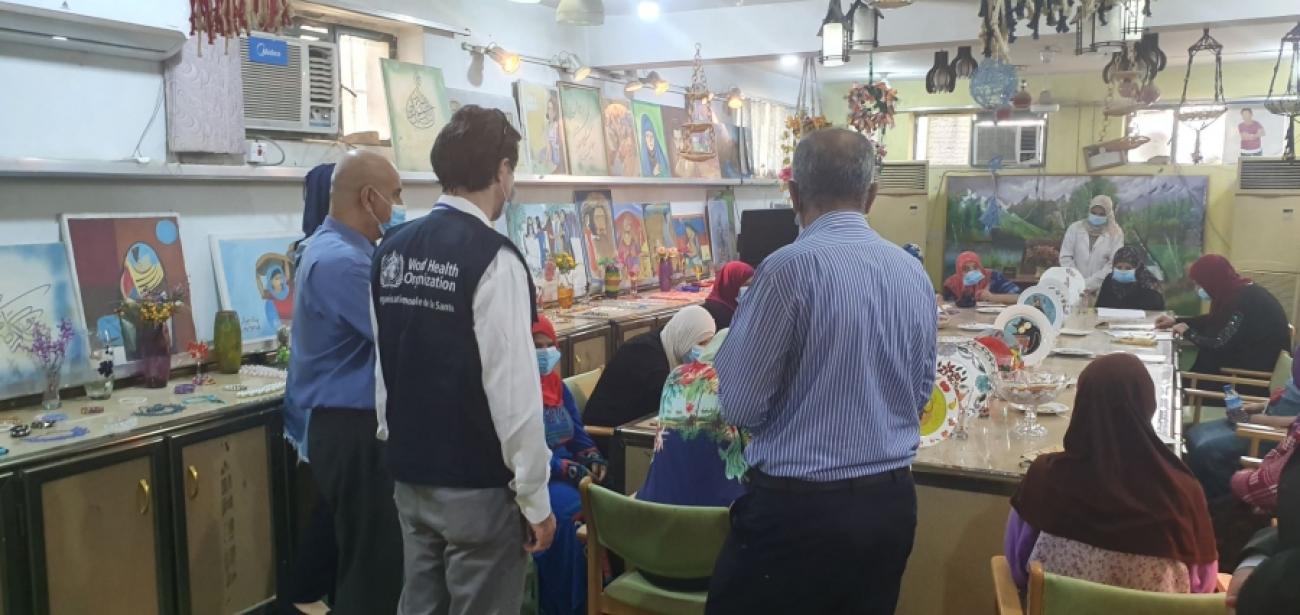More support needed for community-based mental health in Iraq: prioritizing the transition from psychiatric hospital-based to community-based mental health services

Around one in ten persons, approximately 792 million people globally, have a mental or substance use disorder, contributing 10% of the disease's global burden.
Around one in ten persons, approximately 792 million people globally, have a mental or substance use disorder, contributing 10% of the disease's global burden. In Iraq, the demand for mental services is on the rise amidst the COVID-19 pandemic and remains one of the top priority areas that require continued support.
Al-Rashad Psychiatric Hospital is the largest mental health facility in Iraq. It consists of 24 wards and is a long-stay residential facility. Despite its overall capacity of 1200 beds, Al-Rashad Psychiatric Hospital is currently accommodating more than 1440 people. According to the hospital manager, Dr. Ali Rasheed Al-Rikabi, after admission, except for patients in the forensic unit, the rest of hospital admissions are lifelong and are never discharged.
Mr Karim, 62-years old, has been living in the hospital for 38 years. Even though his recovery and clinical conditions do not justify his admission to a mental health facility, Karim is still hospitalized. The long-lasting admissions and the lack of community-based mental health services contribute to the nearly non-existent social reintegration of people with mental disorders that are admitted at the hospital, like Mr. Karim.
Karim is not alone; several other people like him whose mental health status have improved are still living at this hospital. This because they either have no place to go back to or their families cannot take them because of limited space in their houses or fear of the unknown.
Khudhair Abbas Mohammed Ali, 59 years, has been in and out Al-Rashad Hospital since 1981. It is now 17 years since his re-admission to this facility. But he has not seen any of his relatives for the past several months. Like Karim, he looks forward to getting out of the mental health facility and living everyday life.
"I was born in Baghdad, and it's good to get out there again. I miss my relatives, I have three sisters and brothers, but it has been several months since they came to see me. My nephew used to visit me, but he suddenly stopped. I miss my family so much. Help me to get access to them," said Mohammed.
"At this facility, I support my mates, I shave their hair and give talks on mental health, and when there is a medical emergency, I go out of my way to inform the hospital authorities. I can do a lot more when I get out there," added Mohammed.
According to Dr. Ali Rasheed Al-Rikabi, many people currently admitted at the hospital do not have clinical reasons to be hospitalized. They are clinically fully recuperated and should leave the facility. However, due to insufficient implementation of community-based mental health facilities, the support provided to people with mental conditions and their family members, along with the lack of housing, bars them from reintegrating into the community. The hospital manager recommends implementing a deinstitutionalization strategy to reduce the volume and role of psychiatric hospitals in favor of community-based mental health networks.
A model that WHO agrees to: "Looking at the state of many people suffering from mental disorders, WHO will advocate for the MOH to include a robust deinstitutionalization component in the National Mental Health Strategy,' said Dr Adham Ismail, the WHO Country Representative for Iraq.
"We will reach out to health authorities in Iraq and donors to recommend support,” saddedDr Adham
WHO also recommends that the Ministry of Health collaborate with mental health partners and implement the WHO Quality Rights Initiative , which aims to improve access to quality mental health and social services and promote the rights of people with mental health conditions, psychosocial, intellectual and cognitive disabilities.
Over the past years, WHO has worked closely with the Ministry of Health to strengthen mental health at the national and governorate levels through capacity building and mental health supplies like medicines. WHO advocates for developing and strengthening mental health services that are community-based and human rights-oriented.
Iraq has gone through the COVID-19 restrictions on movement, incidents of gender-based violence, child abuse, and domestic violence; however, there is a minimal increase in the number of residents in Al-Rashad Hospital due to the ongoing pandemic. To date, the hospital has recorded 32 COVID-19 positive cases among people with mental health illness in the health facility.
WHO appeals to donors to support mental health interventions in Iraq, especially at this period, where many people are suffering from consequences of COVID-19 and where war and economic strains have negatively impacted mental health. WHO also advocates for more support in strengthening community-based management of mental health and establishing residential facilities, aware that mental health programs are underfunded not only in Iraq but globally.

